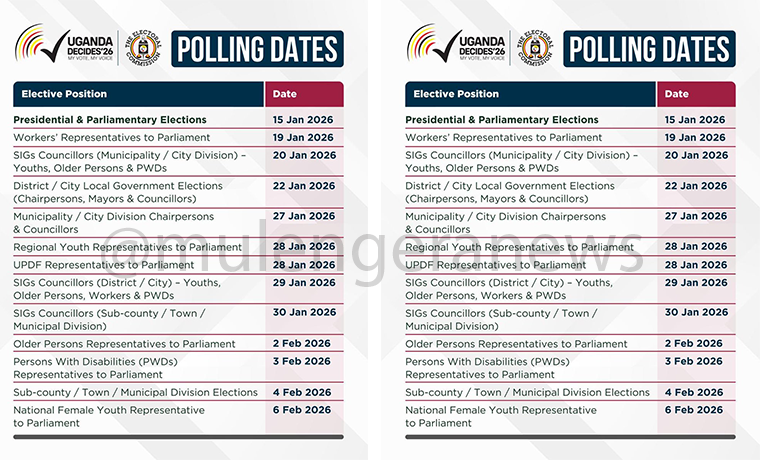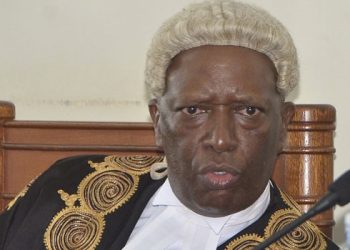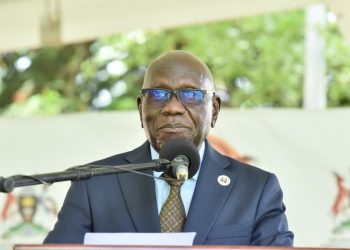By John V Sserwaniko
Having developed cold feet on the original idea of using the PPP (Public Private Partnership) approach as a way of raising money for this particular project, President Museveni recently wrote to Justice Minister Kahinda Otafiire saying he would prefer other alternatives to accomplish the JLOS/Judiciary Headquarters project. To be located partly at the vacant plot next to the High Court and the other portion at Naguru near Police headquarters, the JLOS House project is supposed to house the Supreme Court, Court of Appeal and other Justice Law & Order Sector (JLOS) agencies like the DPP. It has been a pipe dream for many years now as government struggled to find the money for its accomplishment. Under the PPP arrangement, ROKO Construction had offered to meet the construction expenses and later on gradually exit under the Build Operate & Transfer (BOT) arrangement. ROKO had mobilized one other Ugandan company and another partner company from South Africa. But being the Pan-Africanist he is, Museveni developed cold feet while informally raising sovereignty concerns in related meetings with officials from the Ministry of Justice. Convinced that Ugandan companies are too poor to meaningfully participate in such a very expensive PPP project, Museveni was apprehensive about foreign firms totally funding everything.

HIS LETTER:
So he wrote to Otafiire urging him to be very cautious about the proposed PPP. Museveni’s first alternative proposal, in the letter to his trusted Minister and old comrade Otafiire, was to have the Judiciary take up significant space at the government campus being developed in Bwebajja (current location of J&M hotel). Finance Minister Matia, who is spearheading the government campus project, says all government ministries will have to move to this campus and the overall aim is to mitigate rental expenses. Upon consultation with the Judiciary top management, Otafiire wrote back to Museveni eloquently giving very strong reasons why it wouldn’t be prudent having the Judiciary housed at the Bwebajja government campus. Mwesigwa Rukutana, who serves in Otafiire’s ministry as Deputy Attorney General, told Judges and hundreds of lawyers on Monday (at the opening of the new law year) that they had made a very strong case and convinced Cabinet and the President that it would be imprudent to locate the judiciary headquarters in the government campus. “We have convinced them that the Judiciary headquarters is very peculiar and can’t be situated in the one stop center housing the government campus,” Rukutana told his audience adding this would reflect badly on the Judiciary independence. He assured them that money had been found and the contract to build the Judiciary House/Headquarters (that will host the Supreme Court and Court of Appeal plus administrative offices all in one complex) was soon going to be awarded and construction works commence. According to Chief Justice Bart Katureebe, the Judiciary currently annually spends Shs10bn (off its total budget of Shs135bn) on rent. “Of this [Shs10bn] 80% goes on rental fees for Supreme & Court of Appeal,” says Katureebe adding that despite being very expensive, the premises aren’t even adequately suitable for Court work. “It’s sometimes even more expensive to us than just Shs10bn because the contract imposes a penalty whenever rent isn’t paid on time. This renting business is something we as the Judiciary must overcome at the earliest opportunity,” says Katureebe who has used his office to comprehensively explain to the President the very crippling circumstances under which the Judiciary operates each time he meets him. And it’s widely believed that its Katureebe’s good leadership and lobbying skills that have made Museveni realize the urgency with which the crippling situation in the Judiciary must be addressed. That notwithstanding, there is still much more for Katureebe to accomplish as regards government support to the Judiciary. For instance in the Financial Year 2017/18, the Judiciary budget was Shs280bn but the Museveni treasury only provided Shs135bn creating a shortfall of Shs145bn! When it comes to the development budget, the Judiciary was allocated merely Shs5.9bn of which only Shs1.4bn had been released to them as of last month. According to Katureebe, this item is very crucial because it’s what they use for vehicle mantainance, utilities payment, purchasing office equipment and renovation of courts etc.
M7 EARMARKS NSSF CASH:
We at Mulengera news are reliably informed that Museveni has already had a discussion with Finance Ministry officials and directed them to consider using NSSF cash (the Fund has close to Shs10trillions) to accomplish the Judiciary House project. And Museveni, who these days is unusually in a hurry to have things done, wants this project urgently accomplished. These days he resents bureaucratic delays and has vowed to crack the whip on officials who will stand in his way to urgently accomplish the Judiciary House. “Everybody in the Justice Law & Order Sector [JLOS] is nervously excited. We really don’t know why the man these days cares much about us,” said a top official in the Justice Ministry adding that on positively verifying our yesterday story (M7 decreeing Judges retire with their salary), there was great excitement amongst judges. “Many of them have always been very fearful of the unknown harsh life in retirement without a decent package but your story, which we have confirmed to be accurate, has brought smiles to their faces this evening.”

NSSF MD SPEAKS OUT:
Mulengera news last evening rang NSSF Managing Director Mr. Richard Patrick Byarugaba who could neither deny nor confirm our story regarding NSSF money being used to fund JLOS House. While insisting that we speak to his boss the Finance Minister Matia Kasaijja, who has previously hinted on NSSF cash being used to accomplish such major construction projects, a cautious-sounding Byarugaba submitted as follows: “Let me begin by clarifying this. The Fund [NSSF] doesn’t lend money to the government as such. We invest in marketable securities which are issued by government [in lay man’s language this is as good as lending govt]. And when we invest in those securities; that is not lending to government. But kindly look for the minister [Kasaijja]. He will give you a more comprehensive update.” Byarugaba also denied being aware of the latest President’s directive or wish to rely on NSSF money to finance the construction (or refurbishment) of both the Bwebajja government campus as well as the Judiciary House. Watch this space for our subsequent reporting updating this matter. To comment on this & other Mulengera news stories, call/text 0703164755.
































